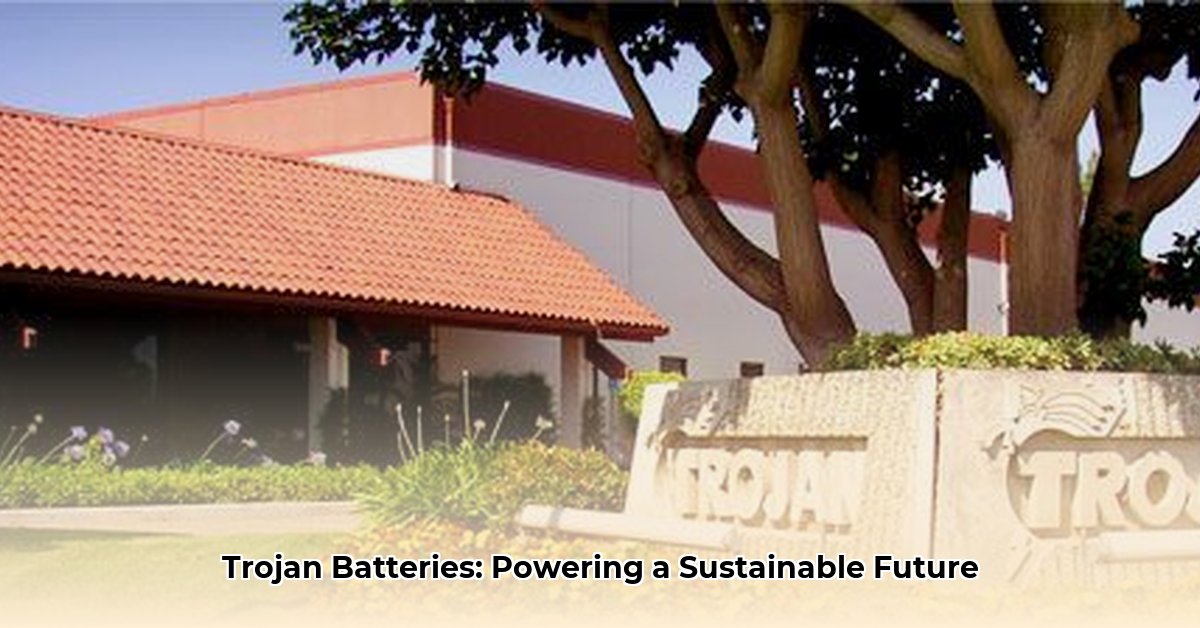
Deep-Cycle Batteries and the Sustainability Question: A Close Look at Trojan
Trojan Battery, a prominent manufacturer of deep-cycle batteries based in Santa Fe Springs, California, plays a significant role in the renewable energy sector. Their products power everything from golf carts to electric vehicles and renewable energy storage systems. But how sustainable are their operations? While Trojan promotes a commitment to environmental responsibility, a closer examination reveals a noticeable lack of publicly available data to substantiate these claims. This article analyzes the available information, highlights significant gaps, and proposes steps towards greater transparency and accountability.
Unpacking the Green Claims: What We Know and Don't Know
Trojan Battery's online presence is readily accessible, providing basic information about their products and operations. However, detailed data on their environmental impact remains surprisingly scarce. Information concerning their carbon footprint, waste management practices, and raw material sourcing is limited. Crucial questions regarding battery recycling processes, supply chain transparency, and overall environmental performance remain largely unanswered. This lack of transparency hinders independent verification of their sustainability claims. For instance, how much energy is consumed in their manufacturing process? What is the precise breakdown of materials used, and how are those materials sourced? These are fundamental questions that demand clear and readily available answers.
This opacity contrasts sharply with the company's marketing which emphasizes sustainability. A consumer or investor seeking to make informed purchasing or investment decisions based on environmental considerations would face significant challenges due to this lack of detailed, verifiable information. Wouldn't a company committed to environmental responsibility strive for greater transparency in its operations?
Shining a Light on the Missing Pieces: The Path Forward
To create a more complete picture of Trojan Battery's environmental performance, increased transparency is essential. Several concrete steps are required:
Comprehensive Life Cycle Assessment (LCA): A detailed LCA would meticulously track the environmental impact of Trojan batteries throughout their entire lifecycle, from raw material extraction and manufacturing to end-of-life disposal and recycling. This would provide a holistic understanding of their overall environmental footprint. This crucial step currently seems to be missing in Trojan's publicly available data.
Detailed and Verified ESG Report: The publication of a comprehensive Environmental, Social, and Governance (ESG) report would showcase Trojan's performance across key sustainability metrics. Such a report should be independently audited to ensure accuracy and reliability, offering critical verifiability for stakeholders.
Strategic Investments in R&D: Continuous investment in research and development to improve battery technology and reduce environmental impact is crucial for any company in the sustainable energy sector. This includes exploring alternative materials and manufacturing processes. Trojan should publicly outline these commitments and timelines.
Embracing the Circular Economy: Adopting a circular economy approach which prioritizes waste reduction, material reuse, and closed-loop recycling, would significantly reduce the environmental burden associated with lead-acid battery production and disposal. This approach isn't just environmentally sound but also creates economic advantages through efficient material management.
Shared Responsibility: A Collaborative Approach
Improving Trojan Battery's sustainability isn't solely the company's responsibility. It requires a collective effort involving various stakeholders:
- Trojan Battery: Proactive release of detailed LCA data and an independently verified ESG report. Invest in R&D and implement circular economy principles.
- Investors: Demand transparency and factor ESG considerations into investment strategies prioritizing companies with proven sustainability records.
- Consumers: Request more information from the company, support sustainable business practices by favoring transparent companies, and consider the full lifecycle implications of their purchases.
- Regulatory Bodies: Enact stronger environmental regulations and incentivize eco-friendly manufacturing methods.
Looking Ahead: The Need for Independent Verification
The significant information gap regarding Trojan Battery's sustainability efforts demands independent verification. This will require independent research, audits, and analyses of their supply chain and waste management practices. Until this information is made publicly available, a comprehensive and unbiased assessment of their claims remains impossible. Increased transparency is paramount to fostering trust and building a more sustainable future for the deep-cycle battery industry. Only with this data can we accurately evaluate if Trojan Battery's actions truly align with their stated ambitions of providing sustainable energy solutions.
Key Takeaways:
- Trojan Battery's environmental performance remains uncertain due to a significant lack of publicly available data.
- Independent verification of their sustainability claims is urgently needed.
- Increased transparency from the company is crucial for building trust and promoting responsible business practices.
- A collective effort from stakeholders is required to drive greater accountability within the deep-cycle battery industry.